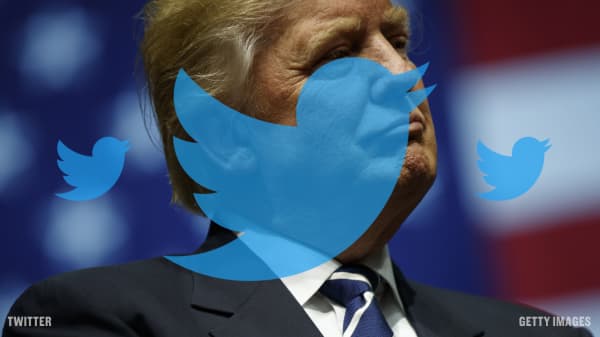This commentary originally appeared on The Hill.
Many of the nation's most respected Republicans and conservatives are publicly or privately terrified about the risks of a Donald Trump presidency to their party and our country.
First, Trump's repeatedly stated admiration for Russian President Vladimir Putin, a dictator who is systematically destroying every mainstream avenue of citizen dissent in his country and systematically attacking democracy in Europe and America, alarms most Republicans as well as Democrats.
Second, Trump is aligning the GOP with players that most members of both parties believe are anathema to American values and American interests. In furtherance of his pro-Putin viewpoints, Trump is now praising Julian Assange of Wikileaks, who is intensely disliked in Republican and Democratic cloakrooms.
Almost all television networks have run stories with headlines such as "Trump sides with Assange over U.S. Intelligence in Russia." Major newspapers across America have run major stories with headlines such as the The Washington Post ran last week: "To some in GOP, Assange is a paragon, not pariah."
The Post quotes Fox News host Sean Hannity's and 2008 GOP vice presidential nominee Sarah Palin's high praise for Assange.
Let's be fair to the GOP, though: Hannity and Palin do not speak for many Republicans elected to any office with their praise of Assange. Most Republicans, like most Democrats, deplore Assange.
Republicans' concern is a patriotic one — that a Republican president and any Republicans or conservatives could praise the likes of Putin and Assange — and political — that the GOP risks being publicly aligned with those who are hostile to their values as a party and our values as Americans.
More from The Hill:
Trump: Tax dollars will 'speed up' the wall
Vicente Fox to Trump: We won't pay for that f***ken wall
Schwarzenegger fires back at Trump
Does Trump want to create a pro-Assange and pro-Putin wing of the GOP? The thought is so surreal and ridiculous that it alarms many Republicans and conservatives, outrages Democrats and liberals, and alienates political independents.
Third, many Republicans as well as Democrats are terrified when Trump repeatedly denies that Russia was behind attacks against American democracy, and when Trump criticizes our entire intelligence community when it unambiguously concludes that Russia was behind these attacks.
Most Republicans agree with Democrats that it is profoundly destructive and damaging to American national security for any commander in chief to publicly castigate and seek to demonize the entire American intelligence community.
The intelligence community is composed of courageous men and women who risk their lives every day to protect, preserve and defend our Constitution, security and democracy. It is also composed of many brilliant and deeply patriotic analysts and experts who have accumulated vast knowledge using their talents and ingenuity to analyze world events to combat the attacks of our enemies and adversaries.
For Trump to repeatedly insult these men and women of the intelligence community, as he previously insulted various women who did not meet his approval, and various other Americans from Hispanics to the handicapped, is a crime against common sense and a hostile attack against those who defend our nation.
It alarms many of the nation's most respected Republicans — who are loathe to state it publicly — that Trump has not grown into the presidency but has, instead, repeated the same destructive tendencies he exhibited as a candidate.
Fourth, many Republicans are well aware of, and deeply concerned by, the fact that Trump often says things that aren't true. There is a debate among the most serious journalists in America, from the editorial page of The Wall Street Journal to the newsroom of The New York Times, about whether Trump should be called a "liar."
What would be worse: If Trump sincerely believes that the Russians were not involved in attacks against our democracy, in which case he would be delusional to the point of national danger, or if he does not believe this, in which case he would be a liar?
Trump has claimed he won a historic landslide, even though Democratic nominee Hillary Clinton defeated him by almost 3 million popular votes, claimed that climate change was a hoax invented by the Chinese, and claimed the Russians were not responsible for attacks against our democracy in the last election, and the large number of regularly repeated false statements by Trump alarms many Republicans as well as Democrats.
Fifth, there is a profound worry among libertarians and civil libertarians, from the right as well as the left, that Trump has dangerously authoritarian tendencies. Can a president who has praised foreign dictators, been intolerant of dissenting voices, and reacts with impulsive anger against those who criticism him be expected to protect our freedom when it is needed most, in a crisis that fires the passions of anger or fear such as a major terror attack?
Sixth, would a commander in chief who impulsively writes angry tweets about foreign leaders, and reacts with intense emotion to real or imagined slights against him, be more likely to trigger an unwise and unnecessary war?
There will be much news on the Russian operation against American democracy in the coming days from hearings of the Senate Armed Services Committee, even more evidence offered from our intelligence services and an intensive intelligence briefing of Trump by intelligence leaders.
The coming week may offer Trump his last opportunity to pivot away from unwise and reckless stands on matters central to our security. Soon, his nominees for key Cabinet posts will testify at confirmation hearings on whether they agree or disagree with Trump about these matters and others.
For now, do not underestimate the extreme concern of many Republicans, whose party now owns the Donald Trump presidency. Their support or opposition to Trump as events unfold will be one of the most important and unpredictable stories of 2017 and the possibility that both parties aggressively break with Trump on national security is real.




